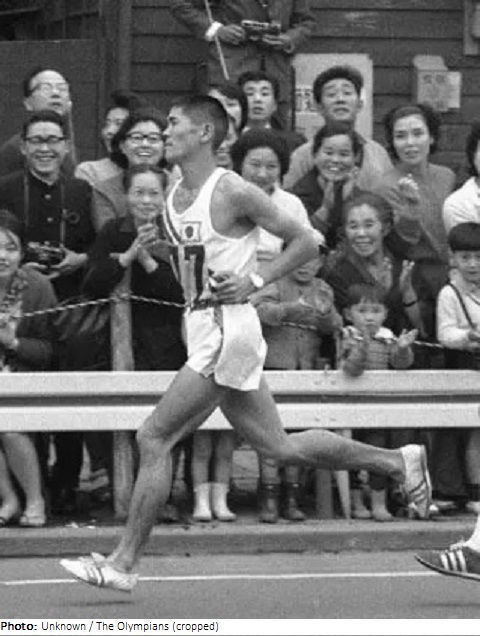
| Roles | Competed in Olympic Games |
|---|---|
| Sex | Male |
| Full name | Kokichi•Tsuburaya |
| Used name | Kokichi•Tsuburaya |
| Original name | 円谷•幸吉 |
| Born | 13 May 1940 in Nerima, Tokyo (JPN) |
| Died | 8 January 1968 (aged 27 years 7 months 26 days) |
| Measurements | 163 cm / 54 kg |
| NOC |  Japan Japan |
| Medals | OG |
| Gold | 0 |
| Silver | 0 |
| Bronze | 1 |
| Total | 1 |
One of seven children born to a disciplinarian father, Kokichi Tsuburaya was born with a left leg that was shorter than the right and suffered from tuberculous arthritis in his legs as a young child. Despite the pain associated with the sport, he followed his elder brother as a runner and began to make a name for himself in high school competitions.
After he graduated from high school, Tsuburaya joined the Army and began to represent them in the long-distance relay races that are ingrained in Japanese tradition. After initially being left out of the Army physical training school programme aimed at the 1964 Summer Olympics due to a back injury, he was brought into the scheme in 1962 and began to build a reputation as a 5,000 and 10,000 m runner on the track.
Seven months before the Tokyo Games he expanded his horizons by running his first marathon and just three weeks after his début earned a place on the Olympic team by finishing runner-up in the Japanese marathon trials. Tsuburaya’s Olympic experience began with an above expectation sixth place in the 10,000 metres in the race forever associated with the remarkable last lap victory sprint of Billy Mills. He was seen very much as the third-string Japanese runner in the marathon due to his youth and inexperience, so it was a surprise to see him as the only home nation athlete in medal contention at the halfway stage.
Tsuburaya lost company with the leading pack early in the race but slowly picked off his opponents as they tired and when Jim Hogan of Ireland dropped with 7 km to go, he was elevated to second place albeit a distant second to Abebe Bikila. He entered the stadium still in the same position but with the fast finishing Briton Basil Heatley quickly making inroads into his lead. The Japanese runner’s energy was spent by this stage and with less than half a lap of the track to go, Heatley sprinted past him. Despite the disappointment of seeing the silver medal slip from his grasp, he was still feted as the only Japanese track and field medal winner at those Games.
The next Olympic cycle was cruel to him. Firstly, his athletic career was severely affected by a series of serious injuries in the shape of a herniated disc exacerbated by overtraining, lumbago and finally an Achilles tendon injury that required surgery in 1967. On a more personal level, Tsuburaya was engaged to be married before his Olympic appearance but, as was the custom at the time, he had to apply to his commanding officer for the wedding to take place. His immediate superiors supported the marriage, but they were overruled by a higher-ranking officer who forbade it to take place until after the 1968 Summer Olympics. The delay put pressure on his fiancé’s family and eventually the engagement was called off and she went on to marry another man. This also lost him the services of his long-time coach who was punished for his protests against the decision by being removed from his duties with the athlete and being demoted in rank.
Tsuburaya learned of his ex-fiancée’s marriage when he went home to his family for the New Year Holidays at the start of 1968 then returned to his training at high altitude in Mexico. On the morning of 8 January 1968, he took a razor blade and slit his carotid artery. His lifeless body was found later the same day with his bronze medal still cradled in his hand. Tsuburaya left a suicide note, more of a suicide poem, in which he thanked his family for their kindness, wishing his nephews and nieces to grow up to be fine men and women, and ended with the haunting lines:
“My dear Father and my dear Mother, your Kokichi is too tired to run anymore. Please forgive him. He is sorry to have worried you all the time. My dear Father and Mother, Kokichi would have liked to have lived by your side.”
In addition, he sent out individual apologies to his old school principal, to a teacher who had been influential in his life, and to the chairman of the Japanese Olympic Organizing Committee: “I’m sorry that I was unable to keep my promise. I pray for your success at the Mexico Games.”
Kokichi Tsuburaya’s suicide is described as the biggest source of pain in Japanese sports history. After the tragedy the Japan Olympic Committee started providing support and mental health care for athletes.
Personal Bests: 10000 – 28:52.6 (1964); Mar – 2-16:23 (1964).
| Games | Discipline (Sport) / Event | NOC / Team | Pos | Medal | As | |
|---|---|---|---|---|---|---|
| 1964 Summer Olympics | Athletics |  JPN JPN |
Kokichi Tsuburaya | |||
| 10,000 metres, Men (Olympic) | 6 | |||||
| Marathon, Men (Olympic) | 3 | Bronze |